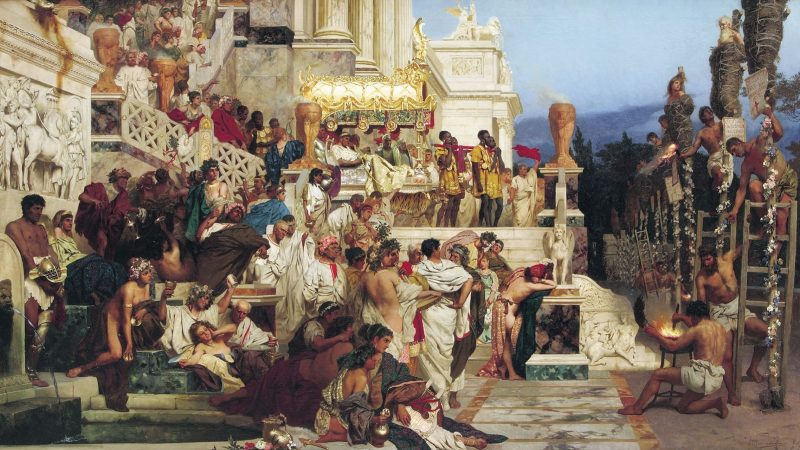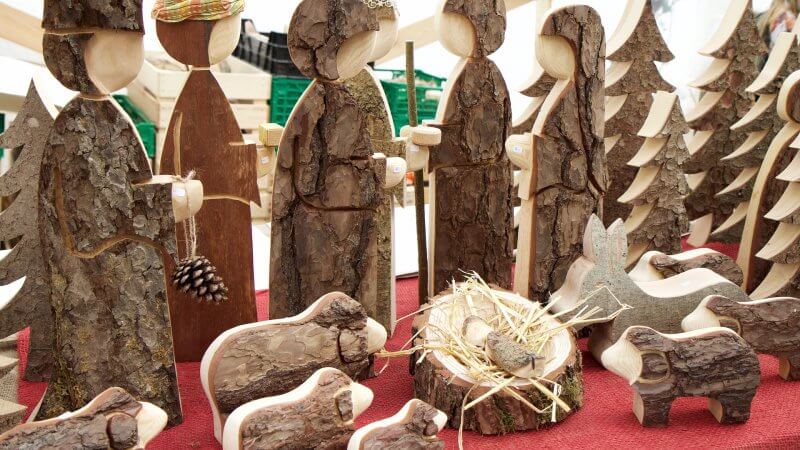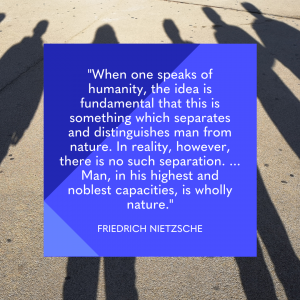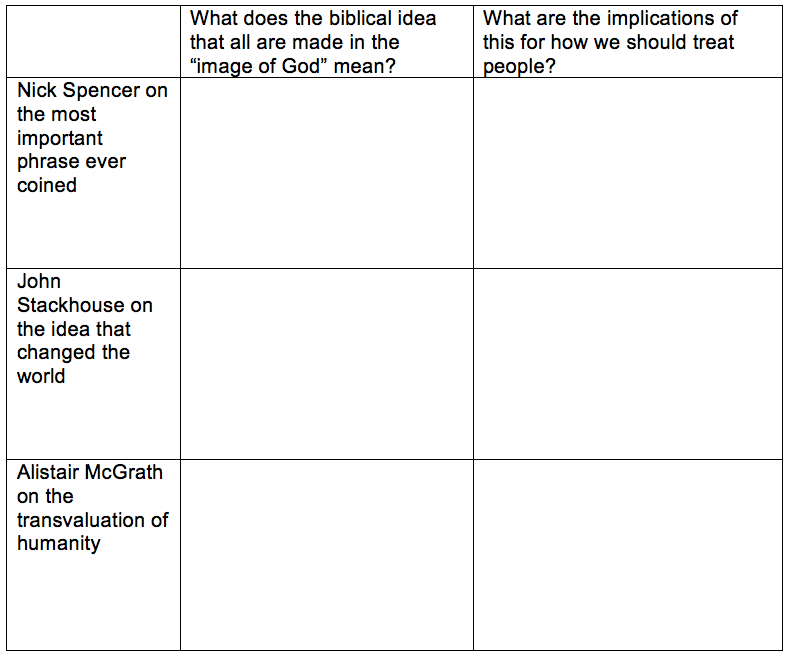Youth Resource
Human Dignity: The Foundation
The videos, articles, and suggested activities in this Classroom Resource explore the Christian foundation for seeing all humans as equally valuable: the Biblical idea that all are created in the ‘image of God’.
You may also want to include these segments from the For the Love of God documentary in this lesson – The Image of God: The Concept; The Image of God: An Illustration; and The Image of God: The Impact – and/or incorporate ideas from this Classroom Resource from the For the Love of God series. There is some overlap between the concepts in that Classroom Resource and this one.
Videos
-
On the most important phrase ever coined
Nick Spencer says nobody really knows what it means – but that hasn’t lessened its impact.
Transcript
You could make the argument that phrase “image of God” – which is not a particularly common phrase in the Scriptures – you could make the argument that it’s probably one of the most important phrases that’s ever been penned by a human being. The problem is that (putting it provocatively) no one really knows what it means. And it’s been interpreted many, many different ways, and very often in ways that aren’t really there in the Scriptures.
So, for an example, towards the end of the 17th century, it was quite popular to interpret the image of God saying, humans are rational. God is rational; humans are rational – that is how we are made in his image. Now, that’s not really there in the text. It’s interpreted different ways; we are relational in the same way as God, Trinity, is relational. We are creative. The God of Genesis 1 is a creative God; we are creative – we have a job to do, which is tending, caring, looking after creation and one another. Different ways of interpreting it.
In a sense, it doesn’t matter too much how you interpret it, as long as you recognise that it is the image of God. And human beings are somehow linked to that which is of absolute value. So, somehow or other, when I’m engaging with you, in some attenuated or thinned out or disturbed kind of a way, I’m engaging with God. And again, that puts a real onus on me to respect you. How that respect cashes out differs in different ways, but the point is that respect is there.
close -
On the idea that changed the world
John Stackhouse explains how the Bible’s picture of humanity undermines social hierarchies.
Transcript
The basic idea in the Jewish Bible, right in the first chapter of their Bible and ours, that God created male and female in God’s image to be lords of the world, as God is Lord of the world, does put us all in the same role. There is no racial distinction, there’s no class distinction; as you are a human being, you are part of this species that is supposed to exercise this benevolent role of gardening the earth and tending the world. So in that sense, everybody is truly equal. The implications of that take a long time to work their way through the fallen, corrupt nature of human society, which tends to say anything but that. Human societies tend to be stratified – various kinds of social relationships to do with power. But eventually, that basic teaching undermines them all.
close -
On the transvaluation of humanity
Alister McGrath says that how we see people is hugely important.
Transcript
I think that the way in which we see somebody else determines the way we behave towards them. So if I were to see somebody simply as a commodity or something that’s there for my convenience, I’m going to exploit them. If I see them, as a Christian would, as bearing God’s image, or someone for whom Jesus Christ died, then I see them in a different way. I’ve got to love them, I’ve got to respect them. And that changes everything.
And so what Christianity does is give you this template, this way of looking at the world, this way of looking at other people which means you value them in a different way. And this transvaluation of humanity is so important. It says you cannot commodify humanity. These are people who God made and loves, and we must therefore treat them in that way. So, for me, what Christianity is saying about human nature is a powerful and significant protest against the impersonal, even dehumanising ways of thinking about people that we find in so many secular philosophies.
close -
On race, class, gender … and the gospel
Edwin Judge says we reject discrimination because our culture is saturated in Christian ideas.
Transcript
Western civilisation is comprehensively saturated with the ideals of the gospel and of the scriptural tradition. Somebody put it to me the other day in criticism of something I said about this that I am ignoring the three great formative forces in our culture (this is historically speaking), namely race, class, and gender. But notice: race, class, and gender are all rejected as criteria for deciding anything. It is discriminatory in our culture, in the West, discriminatory to allow for ethnicity, it’s discriminatory to allow for social class, it’s discriminatory between men and women if you differentiate.
Where does that come from? Galatians chapter 3 verse 28: “There is neither Jew nor Greek, slave nor free, male or female in Christ, but all are one in Christ.” That is the rejection by St Paul of the three great dimensions of life: ethnicity, social position, and the human relationship, male and female. That is cancelled in Christ – that is, in one’s personal standing in Christ, those things are rejected. Exactly those things are now rejected today in our culture. And it comes, therefore, in my view, straight through from the preaching of the gospel absorbed across the centuries and translated particularly in more recent centuries into these anti-discrimination policies we now have.
close
Articles
-

Homo uneconomicus
Natasha Moore on Matt Damon, the 2021 Federal Budget, and how (and why) our view of the human person is profoundly uneconomical.
-

Christos Tsiolkas and the Christian revolution
Simon Smart on Christos Tsiolkas new novel ‘Damascus’ and its stunning portrayal of how radical the message of Jesus was in ancient world.
-

Our secular Western culture is Christianity in disguise
Mark Stephens discusses Tom Holland’s new book Dominion, and how Christianity has shaped the Western mind.
-

In defence of the nativity play
Even if the Christmas story were a myth, that’s no reason to ignore it, writes Natasha Moore.
Engage
- Read Natasha Moore’s Homo uneconomicus column and complete the following activities:
- Brainstorm other examples (real and fictional) when significant resources have been put towards saving a single human life.
- Natasha writes: “Our view of the human person is profoundly uneconomical … and it’s an open secret … that the reason behind it is because we once collectively became convinced that in dealing with another human – any human – we were dealing with an ‘image’ of God.”
- What do you think (and how do you feel) about the idea expressed in these words?
- What questions or puzzles do you have about the ‘image of God’ and what it means?
- What do these words make you want to explore further?
- Read the following quotes, and choose one that particularly stands out to you. Share with another student why you chose that quote, and to what extent you agree with it.




- Set up a Tug for Truth diagram as a class in response to the statement: Christianity has played a central role in promoting human dignity across history.
- Discuss in pairs whether you have an opinion on this question
- Add post-it notes to the diagram for:
- Evidence/support for the ‘Yes’ position
- Evidence/support for the ‘No’ position
- Questions about the tug of war itself (such as ‘what if’ questions)
Understand & Evaluate
- Watch the videos On the most important phrase ever coined; On the idea that changed the world; and On the transvaluation of humanity and fill out this table to summarise what they say.

- Choose one of the articles to read (Christos Tsiolkas and the Christian revolution; Our secular Western culture is Christianity in disguise; and In defence of the nativity play) and answer the following questions:
- What light does this article shed on the contribution of the Christian story to our society’s belief in the dignity and value of all human beings?
- What is one idea raised in the article that you would like to think about more?
- Watch the video On race, class, gender and the gospel. Write a sentence that summarises what Edwin Judge says, and a phrase or word that captures your reaction to his words.
Bible Focus
- From the following Bible passages, create a mind map for what the Bible teaches about the equality and dignity of all human beings.
- Genesis 1:26-28
- Psalm 8:3-8
- Galatians 3:26-28
- Isaiah 43:1-7
- Using Canva, create an Instagram carousel drawing out some key points from the above Bible verses.
Apply
- Return to your earlier Tug for Truth diagram (see Engage Q3), and add more post-it notes based on what you have learnt since.
- Discuss: Has your opinion changed since you started exploring this topic? Why or why not?
- Imagine you lead a government department and are about to announce major funding for an initiative that demonstrates the value of human life. Prepare a speech for a press conference explaining the initiative and justifying the funding, drawing on themes from this lesson.
- Reflect individually: Do you personally view all people as having inherent dignity and worth? If so, is this evident from your actions?
Extend
- Choose another clip from CPX’s What Makes Humans Valuable? category. Watch the video, and create a PowerPoint slide summarising its content to share with the rest of the class.


